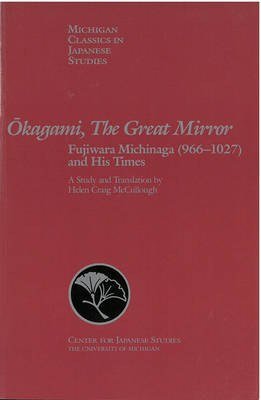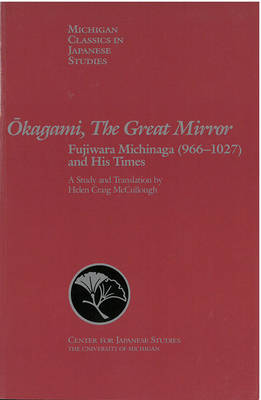
En raison d'une grêve chez bpost, votre commande pourrait être retardée. Vous avez besoin d’un livre rapidement ? Nos magasins vous accueillent à bras ouverts !
- Retrait gratuit dans votre magasin Club
- 7.000.000 titres dans notre catalogue
- Payer en toute sécurité
- Toujours un magasin près de chez vous
En raison de la grêve chez bpost, votre commande pourrait être retardée. Vous avez besoin d’un livre rapidement ? Nos magasins vous accueillent à bras ouverts !
- Retrait gratuit dans votre magasin Club
- 7.000.0000 titres dans notre catalogue
- Payer en toute sécurité
- Toujours un magasin près de chez vous
16,95 €
+ 33 points
Description
Presented here in a new and complete translation is the Japanese classic Ōkagami, a historical tale that mirrors a man's life and the times in which he lived. Dating from the late eleventh or early twelfth century, it focuses on Fujiwara Michinaga, the leading political figure in the great family that dominated the court during most of the Heian period. The Great Mirror can be viewed as a type of history writing, following the rise of an aristocratic family from its seventh-century inception to its zenith in the career of its great descendant. Yet it is no chronicle, since it is not a comprehensive history in any form, whether of Japan or of the Fujiwara family. Important events are treated obliquely, barely mentioned, or omitted outright. The author's stated purpose is to describe and explain his protagonist's brilliant career, so it might seem that The Great Mirror is a mirror of a man's life, a biography. Yet the author displays a persistent tendency to digress. The entire final section of the book is made up of anecdotes that have only the most tenuous connection with Michinaga. In this The Great Mirror exhibits traits of Japanese oral storytelling. Prose literary narratives called setsuwa were open-ended works amenable to accretions and deletions that were collected and circulated by monks and professional storytellers. In the twelfth century, Heian Court society saw itself in catastrophic decline, spurring nostalgia for the reigns of earlier emperors and the desire to collect anecdotes about court society and its concerns. The Great Mirror, though distinct from other collections of its time, is very much a product of this age and spirit.
Spécifications
Parties prenantes
- Auteur(s) :
- Editeur:
Contenu
- Nombre de pages :
- 392
- Langue:
- Anglais
- Collection :
- Tome:
- n° 4
Caractéristiques
- EAN:
- 9780939512508
- Date de parution :
- 01-01-91
- Format:
- Livre broché
- Format numérique:
- Trade paperback (VS)
- Dimensions :
- 155 mm x 234 mm
- Poids :
- 525 g

Les avis
Nous publions uniquement les avis qui respectent les conditions requises. Consultez nos conditions pour les avis.






